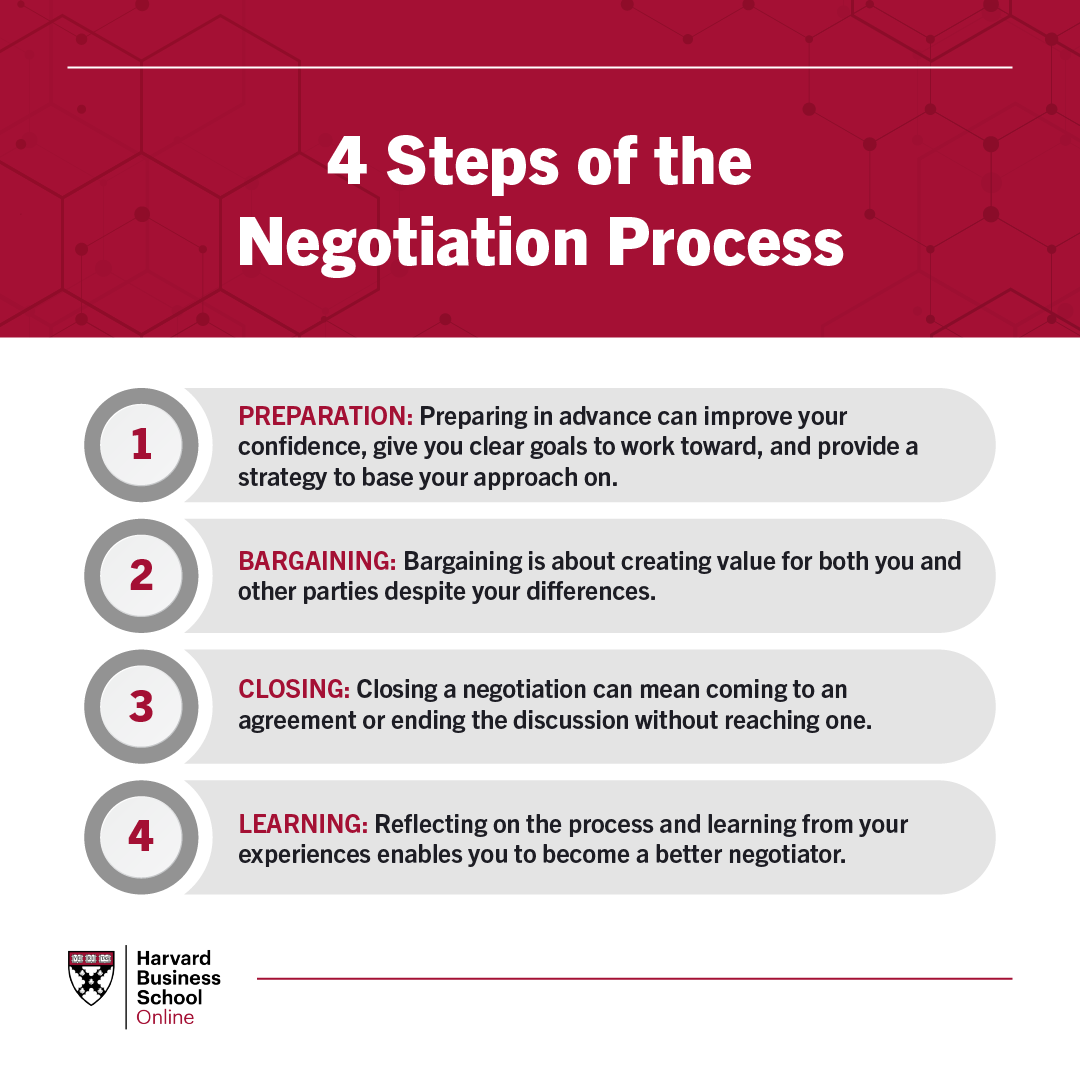

Negotiation is part of daily life—whether buying a car, leasing property, aiming for higher compensation, raising capital for a startup, or making difficult decisions as an organizational leader.
“Enhancing your negotiation skills has an enormous payoff,” says Harvard Business School Professor Michael Wheeler in the online course Negotiation Mastery. “It allows you to reach agreements that might otherwise slip through your fingers. It allows you to expand the pie [and] create value, so you get more benefits from the agreements that you do reach. It also—in some cases—allows you to resolve small differences before they escalate into big conflicts.”
Here's an overview of the negotiation process’s four steps and how to gain the skills you need to negotiate successfully.
Free E-Book: How to Become a More Effective Leader
Access your free e-book today.

Before entering a negotiation, you need to prepare. There are several things to define, including your:
Preparing in advance can improve your confidence, give you clear goals to work toward, and provide a strategy to base your approach on.
The second step, bargaining, is what most often comes to mind when thinking about negotiation. Yet, before discussions even begin, there are three levers that determine how the bargaining stage will play out:
You typically define these levers in a negotiation’s first few minutes simultaneously. You negotiate the “who,” “what,” and “how” implicitly as the broader negotiation happens explicitly.
How do you and other parties enter the room? Do you greet each other warmly and make small talk, or is there immediate tension? How do you first mention the negotiation? What norms do you imply during the conversation?
Through these levers, you can establish the negotiation’s tone, which is vital as you head into it with someone who may greatly differ from you.
Your counterpart may have different preferences, expectations, risk tolerance, and time horizons. The bargaining stage is about creating value for both you and other parties despite your differences. It requires finding the ZOPA and working within that space to claim the value needed to make the negotiation worthwhile.
“There’s a fundamental tension between creating and claiming value,” Wheeler says in Negotiation Mastery. “Negotiation isn’t one or the other—it’s both at the same time.”
The third step in the negotiation process is closing—either coming to an agreement or ending the negotiation without reaching one.
How a negotiation closes depends on each party’s walkaway, BATNA, and ZOPA. It also relies on how you use engaging, framing, and norming to create a relationship with the other parties.
If you can’t reach a solution in the ZOPA, perhaps one or more parties decide to go for their BATNA instead. If you and the other parties create and claim value, you may strike a deal.
The final step of the negotiation process is possible to overlook but critical to your ongoing growth: Reflect on your experience. What went well? What went poorly, and why? How do you feel about the outcome?
No two negotiations are the same. The foundational elements can vary (such as the scenarios and people involved), as well as the finer details (for instance, people’s demeanors, emotions, walkaways, and BATNAs).
Reflecting on the process enables you to get to know yourself better as a negotiator and integrate your learnings into your next negotiation.

Even after learning about the negotiation process, negotiations can still feel intimidating. To gain confidence, it can help to understand the skills that great negotiators possess.
The best negotiators are strong communicators with high emotional intelligence. Developing your skills in those areas can help you form connections with counterparts and communicate goals. They can also enable you to craft a strategy and remain agile as a negotiation progresses.
“Great negotiators have keen analytical skills,” Wheeler says in Negotiation Mastery. “They assess the matter at hand and craft strategy that best fits those particular circumstances. They know that with negotiation strategy, one size doesn’t fit all.”
Finally, you must create value. As Wheeler puts it in the course: You know how to “expand the pie” rather than argue for a bigger slice—creating value for everyone involved while still achieving your goals.
To learn more about the skills needed for successful negotiation, check out the video below and subscribe to our YouTube channel for more explainer content!
Familiarizing yourself with the negotiation process and what each step entails can demystify it and help you feel more comfortable.
The best way to improve your negotiation skills is through practice. This can take place in real life through interactions like determining a lease’s terms or asking for your desired salary in job interviews.
If you’d prefer to practice in a supportive learning environment, consider enrolling in an online negotiation course featuring virtual simulations.
In Negotiation Mastery, Wheeler leads you through negotiation practice by pairing you with other learners for mock negotiations. He then debriefs each scenario so you can reflect on it and integrate the insights into future negotiations.
Through thoughtful preparation and dedicated practice, you can strengthen your skills and create value in any negotiation.
Do you want to deepen your understanding of negotiation dynamics? Explore our eight-week online course Negotiation Mastery, one of our online leadership and management certificate programs. Not sure which course is right for you? Download our free flowchart.

Catherine Cote is a marketing coordinator at Harvard Business School Online. Prior to joining HBS Online, she worked at an early-stage SaaS startup where she found her passion for writing content, and at a digital consulting agency, where she specialized in SEO. Catherine holds a B.A. from Holy Cross, where she studied psychology, education, and Mandarin Chinese. When not at work, you can find her hiking, performing or watching theatre, or hunting for the best burger in Boston.
We offer self-paced programs (with weekly deadlines) on the HBS Online course platform.
Our platform features short, highly produced videos of HBS faculty and guest business experts, interactive graphs and exercises, cold calls to keep you engaged, and opportunities to contribute to a vibrant online community.
We expect to offer our courses in additional languages in the future but, at this time, HBS Online can only be provided in English.
All course content is delivered in written English. Closed captioning in English is available for all videos. There are no live interactions during the course that requires the learner to speak English. Coursework must be completed in English.
No, all of our programs are 100 percent online, and available to participants regardless of their location.
Certificate Programs
HBS Online welcomes committed learners wherever they are—in the world and their careers—irrespective of their professional experience or academic background. To extend the reach of HBS Online, we no longer require an application for our certificate programs. (Applications are still required for our credential programs: CORe and CLIMB.) You can now immediately enroll and start taking the next step in your career.
All programs require the completion of a brief online enrollment form before payment. If you are new to HBS Online, you will be required to set up an account before enrolling in the program of your choice.
Our easy online enrollment form is free, and no special documentation is required. All participants must be at least 18 years of age, proficient in English, and committed to learning and engaging with fellow participants throughout the program.
Updates to your enrollment status will be shown on your account page. HBS Online does not use race, gender, ethnicity, or any protected class as criteria for enrollment for any HBS Online program.
Credential Programs
HBS Online's CORe and CLIMB programs require the completion of a brief application. The applications vary slightly, but all ask for some personal background information. You can apply for and enroll in programs here. If you are new to HBS Online, you will be required to set up an account before starting an application for the program of your choice.
Our easy online application is free, and no special documentation is required. All participants must be at least 18 years of age, proficient in English, and committed to learning and engaging with fellow participants throughout the program.
Updates to your application and enrollment status will be shown on your account page. We confirm enrollment eligibility within one week of your application for CORe and three weeks for CLIMB. HBS Online does not use race, gender, ethnicity, or any protected class as criteria for admissions for any HBS Online program.